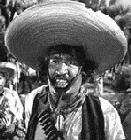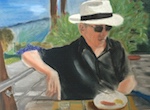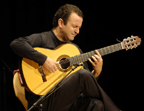Welcome to one of the most active flamenco sites on the Internet. Guests can read most posts but if you want to participate click here to register.
This site is dedicated to the memory of Paco de Lucía, Ron Mitchell, Guy Williams, Linda Elvira, Philip John Lee, Craig Eros, Ben Woods, David Serva and Tom Blackshear who went ahead of us.
We receive 12,200 visitors a month from 200 countries and 1.7 million page impressions a year. To advertise on this site please contact us.
|

|
|
RE: Is It Important
|
You are logged in as Guest
|
|
Users viewing this topic: none
|
|
Login  | |
|

   
Mark2
Posts: 1871
Joined: Jul. 12 2004
From: San Francisco

|
 RE: Is It Important (in reply to NewPlayer) RE: Is It Important (in reply to NewPlayer)
|
|
|
I'm not even on the force, but I understand the mindset. I mean, youtube is so full of "flamenco" players who have no clue, and yet have a thousand comments from people telling them how great they are. Ottmar, the gipsy kings, estaban, you name it. People have the right to like what they like, but it's frustrating for people that love flamenco, and have taken the time to figure out what flamenco is, to see the mis information spread like wildfire. So, it's not the police telling Kalo what to study, it's more like people who have been through what he's going through offering sincere advice. At least that's the way I see it. Cause if you find yourself among people doing flamenco and they hand you the guitar and you play a simple but interesting falseta in compas, they will understand that you understand, and the guy who takes the guitar and plays a difficult paco solo with various compas and accentuation errors will be dismissed. That's not the cops in action. It's the same thing in jazz. go to a jazz jam session, they call out misty and you don't know how to solo over the changes even though your a great rock player. No bueno.
quote:
ORIGINAL: NewPlayer
Uh Oh. The Flamenco Police are here....RUN!!!!!
Officers, which one of you is the Chief?    
|
|
|
|
REPORT THIS POST AS INAPPROPRIATE |
Date Mar. 20 2014 20:50:35
 |
|

   
mark indigo
Posts: 3625
Joined: Dec. 5 2007

|
 RE: Is It Important (in reply to Paul Magnussen) RE: Is It Important (in reply to Paul Magnussen)
|
|
|
quote:
There’s a famous story about how Lucía once had to accompany Mairena, who was less than enthusiastic about the modern style of guitar. So he thought, What would Mairena want? And the answer was, He would want Melchor.
So Lucía deliberately played like Melchor, and Mairena congratulated him afterwards.
Here they are:
http://www.pacodelucia.org/foro/viewtopic.php?f=3&t=1469
I had never heard these recordings before.
I just listened to them, and thought it was interesting that while Paco might have accompanied like Melchor,
he still used his own falsetas, or shortened versions of, including some of his innovations like 4 to a beat alzapúa
(where I think Melchor would have used 3 to a beat/ triplets) and an occasional burst of fast picado.
The falsetas are all short punctuations of the cante, tasteful and appropriate (I think), but a good example of "old" and "new" together.
_____________________________
|
|
|
|
REPORT THIS POST AS INAPPROPRIATE |
Date Mar. 20 2014 21:32:46
 |
|

   
Ricardo
Posts: 14801
Joined: Dec. 14 2004
From: Washington DC

|
 RE: Is It Important (in reply to z6) RE: Is It Important (in reply to z6)
|
|
|
quote:
It's kind of getting it arse about face but I think a good technique would be very advantageous to everything one would need to know to really learn flamenco. Learning it completely outside the world of flamenco (from videos, here, etc.) is hard enough but being able, for example, not only to handle the basic techniques to an advanced level but to change between them with the ease that paco's music requires would speed up the process immensely.
There are different disciplines for different music styles. In classical guitar, it seems, lots of things are about finding a technique or fingering to execute some passage of music. For example, finding fingerings etc that work for adapting a Violin sonata or cello suite to the guitar, one faces technical "hurdles" that need to be overcome. And there will be multiple ways to do it, and therefore multiple interpretations. Some guitar pieces (in classical world I mean pieces composed for the guitar) often not even composed by guitar players, so similar issues. THen there are piece composed by players that lay more comfortably on the instrument, but we often just claim the pieces to also be "easier" even if musically they are sophisticated.
When we talk about studying the traditional flamenco, or rather within that music lies the base, we are not implying that the student mimic the sounds on a scratchy old record with chunka chunk chords and an out of tune singer. We are talking about specific techniques that were done by the maestros of old that are like "devices" that help your hands deal with creating the flamenco sound. In other words, the music comes out as a result of techniques, so we don't need to look back and find a way to learn that music. This thing is not necessarily specific to say N. Ricardo or who ever, but carries through to the modern players. Hence, the seeming fluidity of any modern maestro is a result of music being an expression of the technique already "mastered". Creativity and expression all able to flow as a result of having certain "devices" down cold.
This CAN be learned via a modern player as well as an older player. Further it is a miss conception that the music of say MONTOYA was easier than all the rest, not AT ALL true. THe point there of studying Montoya is that we have the base FORMS blue printed. Inside these "pieces" are also the advanced technique devices used by PDL or any other modern player. There are not really any new techniques I have heard since Montoya. But we might suddenly notice a technique because of a how a modern player USES it to compose his own thing. (an example is flicking rasgueado, that Montoya certainly used but not as often as say CHicuelo). People talk of Moraito, often , as "easy" flamenco, yet when you sit down and try to make that sound without the technique he posses, it doesn't come out, as easy as you might think the music to be. Yet if you had studied a bit of PDL or N. Ricardo technique devices, well then perhaps you can get that sound quicker.
THere is a large percentage of new comers to flamenco that sit down and try to learn PDL music note for note by ear, or from a score....like I said, it CAN be done (learn proper technique and extrapolate the base of flamenco form and technique etc) but it is not easy without a teacher or guide to point out the IMPORTANT details that will help. True, it is no easier when looking at music of say N. Ricardo...but in the older players, the technique devices become much more clear and obvious, hence so many of us point to the old school for getting the base down solidly.
Ricardo
_____________________________
CD's and transcriptions available here:
www.ricardomarlow.com
|
|
|
|
REPORT THIS POST AS INAPPROPRIATE |
Date Mar. 21 2014 12:15:04
 |
|

   
mark indigo
Posts: 3625
Joined: Dec. 5 2007

|
 RE: Is It Important (in reply to mark indigo) RE: Is It Important (in reply to mark indigo)
|
|
|
quote:
quote:In terms of raw coordination it is simply much more difficult for a 'beginner' to play the syncopations of a modern piece compared to say Sabicas of Montoya.
quote:
quote:I'm not sure that that's true, that the co-ordination is more difficult? harder for a beginner to hear, and they need a stronger feel for compás, yes....
quote:
Harder to feel/tap a steady beat when the melody is made up of mostly contras. This is basic coordination and most kids just don't get it for a long time.
I think we are probably having different ideas about what "co-ordination" is;
What I am calling "co-ordination" is the ability send clear messages from the brain to the hands asking them to perform a task.
The physical task of clapping contra is identical to clapping the beat, so the "co-ordination" is the same.
What I refer to as "hear and... feel for compas" is the perception and conception of the sounds, which I agree contra and syncopation are much harder for the beginner to get.
But my original point was that
quote:
the way I see it (or hear it) there isn't a massive split between "modern" and "traditional" - the contemporary expression of the tradition includes all the old stuff, and adds the new stuff to it.
If your reference for "modern" is the latest recordings by the most avante garde artists, then sure, it's complex, syncopated, advanced etc.
But I think that is one end of a spectrum of what is going on.
If you include more grassroots players and guitarists accompanying cante recordings you will hear more of a variety of personal styles and levels of complexity and syncopation in the falsetas etc.
Which is why I made the point about it being not absolutely necessary to begin learning only from historical sources, there are also modern sources that can supply the basics.
Which is not to say anyone should ignore or reject the old stuff either.
_____________________________
|
|
|
|
REPORT THIS POST AS INAPPROPRIATE |
Date Mar. 22 2014 12:25:26
 |
|

   
mark indigo
Posts: 3625
Joined: Dec. 5 2007

|
 RE: Is It Important (in reply to guitarbuddha) RE: Is It Important (in reply to guitarbuddha)
|
|
|
I guess we will have to agree to disagree on what part of the process is defined as "co-ordination"
quote:
I agree with you that modern stuff sounds cool
I never said it sounds cool, and I have not advocated beginners start with Paco de Lucía (although what Paco was doing in the early to mid seventies is now "traditional", so if people are advocating beginners start with "traditional" they are advocating, in part, starting with Paco de Lucía),
I have been trying to point out that the concepts of "traditional" and "modern" are not mutually exclusive, and not always helpful;
that anyway there is a spectrum of time periods
that modern flamenco is more than just the most advanced complex syncopated falsetas of the top guitarists, that there is a spectrum and variety going on right now;
that not all traditional or historical material is simple or easy, and not all modern material is difficult or complex
that it is not necessary to only focus on historical material, because modern teachers make and adapt their own material for teaching that is (in my experience) a part of the continuing tradition, versions of old and new and their own compositions.
_____________________________
|
|
|
|
REPORT THIS POST AS INAPPROPRIATE |
Date Mar. 22 2014 15:14:36
 |
|

   
pjn
Posts: 113
Joined: Mar. 23 2009
From: New York

|
 RE: Is It Important (in reply to mark indigo) RE: Is It Important (in reply to mark indigo)
|
|
|
Not replying to any particular post here -- it is being taken for granted that 'solo' flamenco guitar is the subject under discussion. This is a relatively new form really; traditionally of course, it was as accompanist for singing and dancing that the guitarist functioned; and all players learned the forms, rhythms, styles, etc. of flamenco by necessity -- and if you didn't know these things backwards and forwards you were a joke.
Sure, if you're playing by yourself you can fool around with flamenco a lot; and on the other side of the coin, if you're a 'soloist' you better play something interesting or you simply won't cut it -- so this has given rise to, and allowed for, all the experimentation and so forth.
Nevertheless, I'd say pretty much all our heroes learned to accompany cante before developing their highly evolved styles. In the absence of that kind of schooling, and if we come from outside the flamenco world, flamenco virtuosity is easier than flamenco knowledge and that's a bit of a trap I think.
|
|
|
|
REPORT THIS POST AS INAPPROPRIATE |
Date Mar. 23 2014 17:10:02
 |
|
 New Messages New Messages |
 No New Messages No New Messages |
 Hot Topic w/ New Messages Hot Topic w/ New Messages |
 Hot Topic w/o New Messages Hot Topic w/o New Messages |
 Locked w/ New Messages Locked w/ New Messages |
 Locked w/o New Messages Locked w/o New Messages |
|
 Post New Thread
Post New Thread
 Reply to Message
Reply to Message
 Post New Poll
Post New Poll
 Submit Vote
Submit Vote
 Delete My Own Post
Delete My Own Post
 Delete My Own Thread
Delete My Own Thread
 Rate Posts
Rate Posts
|
|
|
Forum Software powered by ASP Playground Advanced Edition 2.0.5
Copyright © 2000 - 2003 ASPPlayground.NET |
0.09375 secs.
|


 Printable Version
Printable Version











 New Messages
New Messages No New Messages
No New Messages Hot Topic w/ New Messages
Hot Topic w/ New Messages Hot Topic w/o New Messages
Hot Topic w/o New Messages Locked w/ New Messages
Locked w/ New Messages Locked w/o New Messages
Locked w/o New Messages Post New Thread
Post New Thread